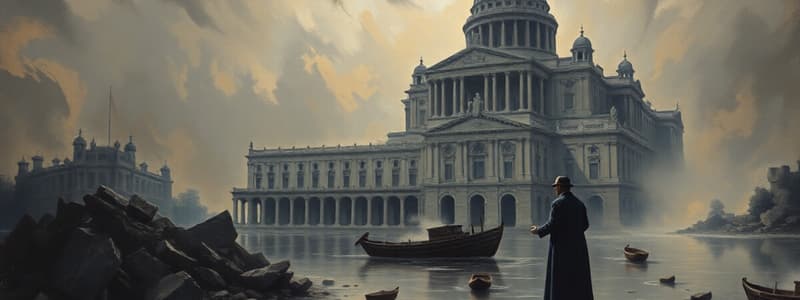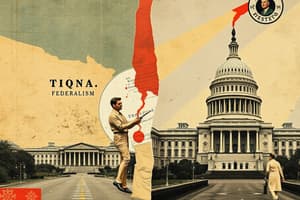Podcast
Questions and Answers
According to the passage, what is a key characteristic that makes humans prone to institutional decay?
According to the passage, what is a key characteristic that makes humans prone to institutional decay?
Humans are naturally rule-following and resistant to change, making them susceptible to institutions becoming outdated and failing to adapt to new circumstances.
What is the fundamental purpose of checks and balances in the American political system, as described in the passage?
What is the fundamental purpose of checks and balances in the American political system, as described in the passage?
Checks and balances aim to prevent any single branch of government from accumulating excessive power, safeguarding citizens' freedom and liberty.
Based on the passage, what is a potential weakness of the American system of checks and balances?
Based on the passage, what is a potential weakness of the American system of checks and balances?
The system may struggle to effectively address urgent national needs when a lack of social consensus on political goals hinders the implementation of necessary actions.
What is the main challenge faced by American political institutions in the present, according to the passage?
What is the main challenge faced by American political institutions in the present, according to the passage?
What is meant by the phrase "a law of the conservation of institutions" as used in the passage?
What is meant by the phrase "a law of the conservation of institutions" as used in the passage?
How does the passage define political decay?
How does the passage define political decay?
What is the author's primary concern regarding the U.S. Constitution and its role in preventing tyrannical power?
What is the author's primary concern regarding the U.S. Constitution and its role in preventing tyrannical power?
What does the passage suggest is the primary root cause of America's long-term fiscal issues?
What does the passage suggest is the primary root cause of America's long-term fiscal issues?
What is the main issue facing American politics today?
What is the main issue facing American politics today?
What is the author's solution to the issues facing American politics?
What is the author's solution to the issues facing American politics?
Name two specific examples of the challenges faced by the United States as discussed in the text.
Name two specific examples of the challenges faced by the United States as discussed in the text.
Explain how the author connects the polarization of American politics to the trend of homogenization in society.
Explain how the author connects the polarization of American politics to the trend of homogenization in society.
How does the author describe the role of interest groups in American politics?
How does the author describe the role of interest groups in American politics?
What does the author argue is the connection between income inequality and the legitimacy of the American political system?
What does the author argue is the connection between income inequality and the legitimacy of the American political system?
What is the author's main point about the financial crisis of 2008-2009?
What is the author's main point about the financial crisis of 2008-2009?
How does the author connect the historical examples of the Mamluk Sultanate and the late Ming Dynasty to the current situation in the United States?
How does the author connect the historical examples of the Mamluk Sultanate and the late Ming Dynasty to the current situation in the United States?
According to the author, what are the consequences of failing to address major fiscal crises?
According to the author, what are the consequences of failing to address major fiscal crises?
How does the author portray the current state of the United States in relation to its historical counterparts?
How does the author portray the current state of the United States in relation to its historical counterparts?
Identify two specific examples of the author's use of historical analogies in the text.
Identify two specific examples of the author's use of historical analogies in the text.
How does the author connect the issue of income inequality to the concern about political representation?
How does the author connect the issue of income inequality to the concern about political representation?
What is the author's overall thesis on the state of American politics?
What is the author's overall thesis on the state of American politics?
What does the author mean by "institutional inertia" in the context of American politics?
What does the author mean by "institutional inertia" in the context of American politics?
In the author's view, what is the most crucial factor for the future of American politics?
In the author's view, what is the most crucial factor for the future of American politics?
Flashcards
Political Decay
Political Decay
The failure of political systems to adapt to changing circumstances, leading to ineffective governance.
Conservation of Institutions
Conservation of Institutions
The idea that political institutions are maintained over time, despite changing societal needs.
Checks and Balances
Checks and Balances
A system in the U.S. Constitution designed to prevent any one branch of government from having too much power.
Social Consensus
Social Consensus
Signup and view all the flashcards
Entrenched Stakeholders
Entrenched Stakeholders
Signup and view all the flashcards
Fiscal Situation
Fiscal Situation
Signup and view all the flashcards
Political Leadership
Political Leadership
Signup and view all the flashcards
Tyrannical Control
Tyrannical Control
Signup and view all the flashcards
Fiscal Shortfall
Fiscal Shortfall
Signup and view all the flashcards
Foreign Indebtedness
Foreign Indebtedness
Signup and view all the flashcards
Congressional Polarization
Congressional Polarization
Signup and view all the flashcards
Ideological Homogeneity
Ideological Homogeneity
Signup and view all the flashcards
Social Sorting
Social Sorting
Signup and view all the flashcards
Entrenched Interest Groups
Entrenched Interest Groups
Signup and view all the flashcards
Populist Anger
Populist Anger
Signup and view all the flashcards
Income Inequality
Income Inequality
Signup and view all the flashcards
Intergenerational Social Mobility
Intergenerational Social Mobility
Signup and view all the flashcards
Institutional Inertia
Institutional Inertia
Signup and view all the flashcards
Short-term Fixes
Short-term Fixes
Signup and view all the flashcards
Legitimacy of the State
Legitimacy of the State
Signup and view all the flashcards
Comparative Fiscal Crisis
Comparative Fiscal Crisis
Signup and view all the flashcards
Behavior of Elites
Behavior of Elites
Signup and view all the flashcards
Study Notes
Political Decay in Democracies
- Political systems decay when they fail to adapt to changing circumstances, creating a disjunction between institutions and needs.
- Entrenched stakeholders resist change due to ingrained rules and values.
- American political institutions face a major adaptability test.
American Political System's Challenges
- Built on checks and balances to prevent tyranny, but these safeguards rely on consensus for strong government.
- Recent years have lacked social consensus, hindering effective governance.
- Fiscal challenges, including overspending and low taxation, threaten American power.
Polarization and Gridlock in Congress
- Congress is highly polarized, hindering legislation.
- Ideological homogeneity and declining deliberative debate contribute to the problem.
- Presidential leadership has been absent, exacerbating the polarization.
Societal Factors Contributing to Political Decay
- Homogenization of neighborhoods and regions based on ideology, amplified by media fragmentation.
- Entrenched interest groups (e.g., labor unions, agribusiness) exert veto power, potentially hindering legislation.
- Populist anger related to inequality and perceived elite dominance arises.
Inequality and Intergenerational Mobility
- Increasing income and wealth inequality since the 1970s, despite American emphasis on equality of opportunity.
- Intergenerational social mobility is lower than perceived in the U.S., and lower than in other developed countries.
- Elites protect their positions through political maneuvering and tax avoidance.
Historical Examples of Political Decay
- Historical examples show no automatic mechanism for political systems to adjust to changes.
- The Mamluk Sultanate in Egypt and the late Ming Dynasty in China illustrate failure to adapt to external threats.
- The French monarchy's inability to reform after fiscal crisis led to its downfall.
Conclusion
- U.S. faces a serious situation but not as dire as the French monarchy before the revolution.
- Without powerful intervention, the system's dysfunction might worsen.
Studying That Suits You
Use AI to generate personalized quizzes and flashcards to suit your learning preferences.




